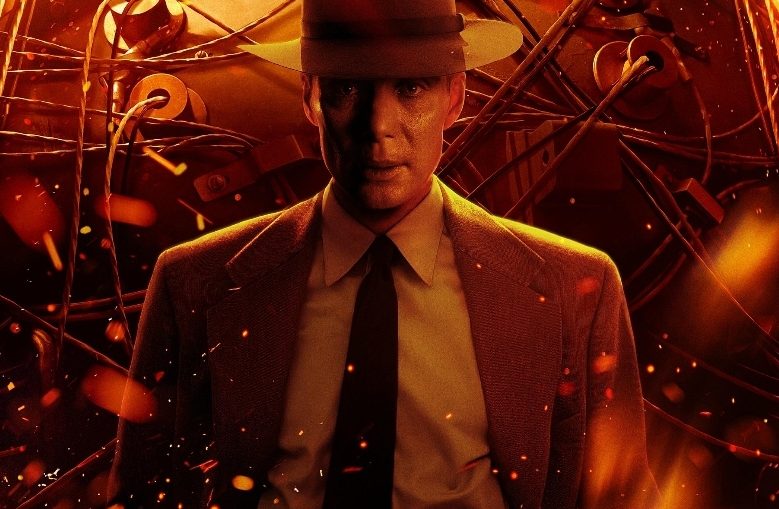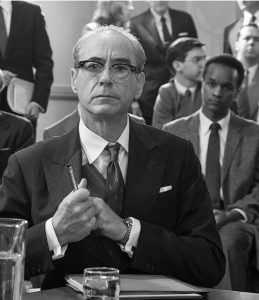
Oppenheimer, directed by Christopher Nolan, is an ambitious and thought-provoking film that delves into the life of renowned physicist Robert Oppenheimer and his pivotal role in developing the atomic bombs that would eventually bring an end to World War II. With an immersive use of music and a stellar cast, the film takes viewers on a journey that explores the complexities of scientific discovery, moral dilemmas, and the consequences of wielding such immense power. Let’s not forget I saw this little diddy in 70 MM Filmstock, making for particularly special sound and visually unstoppable.
Christopher Nolan, known for his masterful storytelling and innovative filmmaking techniques, once again showcases his directorial prowess in Oppenheimer. Through skillful cinematography and a meticulously crafted narrative, he captures the essence of the era, transporting viewers to the inner workings of Oppenheimer’s world. Nolan’s signature use of non-linear storytelling adds depth and complexity to the film, enhancing the audience’s engagement and understanding of the story. We’re set in several different times in Oppenheimers life and we constantly flip back and forth in only a way Nolan can tell story.
One of the standout elements of Oppenheimer is the use of music throughout the film. Nolan’s collaboration with renowned Ludwig Gorranson creates a soundscape that immerses viewers in the emotional intensity and weightiness of the subject matter. The score, specifically designed to evoke the feeling of being inside a bomb, adds a layer of tension and urgency, effectively enhancing the overall cinematic experience. It’s also important to note, Ludwig, wrote the score in five days. I don’t think I’ve ever finished anything in five days excepting possibly breakfast buffetts.
Emily Blunt’s portrayal of Oppenheimer’s wife, Katherine “Kitty” Oppenheimer, an alcoholic struggling with her husband’s infidelity and dessertion, is nothing short of exceptional. Blunt’s ability to convey complex emotions with subtlety and nuance shines in every scene she graces. Her performance adds depth and humanity to the narrative, providing a captivating counterbalance to Oppenheimer’s scientific pursuits.

However, it is worth noting that Oppenheimer, like many historical dramas, falls into the trap of weakly portraying its female characters. Given Oppenheimer’s womanizing tendencies, the film’s portrayal of women as mere victims or objects of desire can be somewhat disappointing. While this may reflect the reality of the time, it would have been refreshing to see stronger female characters who played a more active role in the narrative.
Robert Downey Jr.’s portrayal of Lewis Strauss, the antagonist of the story, is a standout performance that showcases his versatility as an actor. Downey captures the essence of Strauss with charisma and intensity, imbuing the character with a magnetic presence. His portrayal adds a layer of complexity to the film, elevating the tension and conflict between Oppenheimer and Strauss. Downey has always been a favorite. I still love him for his efforts on SNL.

Oppenheimer’s release alongside its box office rival, Barbie, offers audiences a stark contrast in subject matter and cinematic experience. While Barbie may capture the hearts of some, Oppenheimer presents a thought-provoking and intellectually stimulating journey into one of history’s most significant scientific breakthroughs. Both great important films.
In conclusion, Oppenheimer is a visually stunning and intellectually engaging film that explores the complex life of Robert Oppenheimer and his contribution to the creation of the atomic bomb. Christopher Nolan’s masterful direction, coupled with the immersive use of music, creates a captivating cinematic experience. Emily Blunt’s remarkable performance of Katherine Oppenheimer and Robert Downey Jr.’s portrayal of Lewis Strauss add depth and intrigue to the narrative. However, the film falls short in its portrayal of women, which is a missed opportunity for greater inclusivity. Regardless, Oppenheimer is a must-see for those seeking a thought-provoking and visually stunning exploration of history’s most pivotal moments. Go see this film and forever say you didn’t
 Friday, July 18, 2025
Friday, July 18, 2025